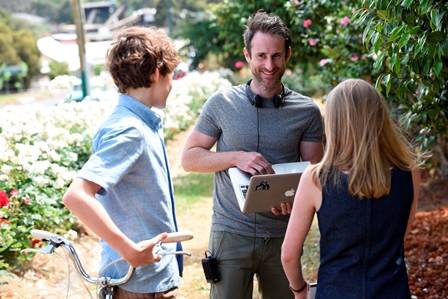Silvey on set with stars Levi Miller and Angourie Rice.
'Jasper Jones' author Craig Silvey came on board to adapt his own novel after multiple drafts had been penned by Shaun Grant ('Snowtown', 'Berlin Syndrome').
How involved were you in the development process?
I was the second screenwriter to come on board. I was more or less a consultant for a few years [beforehand] while I was touring the book and working on other things. Pre-production tends to move quite slowly. I came on board in a much more influential way later in the process.
Was it strange, returning to a story you thought you had put to bed?
It’s a process of identifying the key elements of the story. I had a really good opportunity to know what those were, simply because I’d toured the book so much and talked to so many readers who were really passionate about it. So I knew the critical beats. Additionally I had the great fortune of having the book adapted for [the] stage by a very talented writer called Kate Mulvany. So I had an opportunity to see what it could look like in a different medium. And under the direction of Rachel [Perkins] and the producers as well, it wasn’t too difficult to find what was going to work and what had to go.
What were the big challenges?
Shaun [Grant] is a very experienced screenwriter, and one of the elements he identified as problematic was the issue of making Charlie, the main character – who is this kind of shy, awkward and frightened young boy, [and] who’s very much an observer in the novel – a little bit more influential in the film. It’s difficult in film to have somebody as a main protagonist who isn’t pushing the action and influencing scenes. So it was a matter of trying to retain the character’s true nature, which is very reactive and pensive, but also give him the opportunity to make changes within the story. Part of the solution was making Charlie a little bit more of a detective in trying to solve this mystery, and make him a little bit more accountable for some of those decisions.
Were you involved in the shoot?
I was there for the duration. Rachel was insanely generous and insanely respectful of the source material, and I guess she found a great resource in me given I knew the book and the script so well.
There’s that famous William Goldman line that goes something like: “Your first day on a movie set is the most exciting day of your life, and the second day is the dullest.”
(Laughs). Certainly the saying ‘hurry up and wait’ is very true. But I found myself busier than I thought I’d be, and I felt very privileged and very grateful watching a fantastic crew work so hard, and [watching] these very talented actors spark these characters into life.
What did you learn from being on-set?
You require a fair bit of agility on a film set. Sometimes things aren’t working or certain elements need to change and you’ll have to very quickly write solutions to those problems. So there’s a lot of writing on the fly. I certainly wasn’t blocking shots or getting in anyone’s way, but I was a resource for the kids in particular who might have had questions about their characters. I was also more or less a cricket coach for Kevin [Long], who played Geoffrey Lu. The character is a very accomplished cricketer. Unfortunately Kevin had no idea about the game of cricket at all, and in a few short months I had to train him to the point where he could passably act as a very proficient cricketer. So moments I wasn’t on-set I was down at the nets with Geoffrey, practising his cover drives.
Where did you shoot?
There was some discussion about that. The Corrigan in the book is drier, flatter, more of a wheat belt town, with a distant mine attached. It felt in my mind a lot hotter and crisper and browner. But then we found Pemberton, and it’s got these beautiful old mill houses and it just feels very complete. It’s quite contained, and we just knew that it was the perfect place to set our film. So suddenly a mining town turned into a mill town, and certain peripheral aspects of the story had to be tweaked. But I think the film is no less beautiful for it; the country down there is spectacular. And there’s something eerie and suffocating about the bush down there.
Have you caught the screenwriting bug?
I don’t think it’ll be the last film I write. When I get the first spark of a story now, my first thought is: what is this – is it a novel or a film? I’ve got a couple of projects that I’m loosely developing and I think would work on the screen.
Silvey and director Rachel Perkins recently received funding from Screen Australia to develop a contemporary western titled 'The Prospector', set in WA, in which "a woman risks everything to find her missing husband". Blackfella Films' Darren Dale and Miranda Dear are on board to produce.


